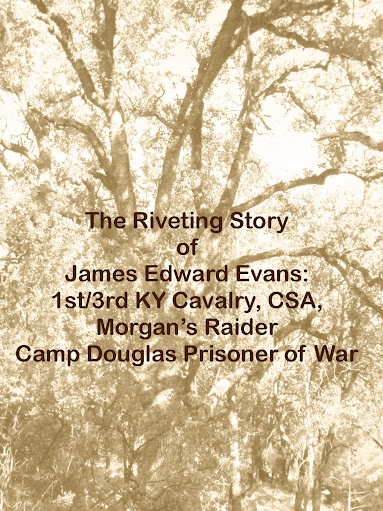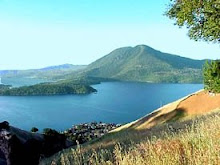“When Jeff Davis, President of the Confederacy, was on his deathbed, he was asked by his wife what he would have done differently. He replied, “I would like to have been a cavalryman.’ ”
~Steven Woodward [i]
September 3, 1862
Leading a triumphant parade before a large and welcoming crowd, John Hunt Morgan returned to Lexington, Kentucky. Morgan was in his glory.[ii] He enjoyed nothing as much as basking in public acclaim. At 6’0”, 180 pounds, Morgan was considered quite handsome. His charismatic personality had a charming affect upon those in his company.[iii] Women fawned over him. Little boys longed to be Morgan, “the Thunderbolt of the Confederacy.” Childhood friends gathered to toast his return. Morgan had come home a hero.
Lexington, the town in which Morgan had been a businessman and militia leader prior to the outbreak of the Civil War, was also the home of his beloved mother. Thus, the homecoming was an emotional reward for the recently widowed Morgan.
Yet, not every Kentuckian was thrilled to learn of Morgan’s return. Abraham Lincoln fretted over the Confederate invasion of Kentucky. The war continued to weigh heavily upon his mind. Thus Lincoln, along with his secretaries Nicolay and Hay, felt compelled to write "Meditation on the Divine Will" in which Lincoln mused:
“The will of God prevails. In great contests each party claims to act in accordance with the will of God. Both may be, and one must be, wrong. God can not be for and against the same thing at the same time. In the present civil war it is quite possible that God's purpose is something different from the purpose of either party—and yet the human instrumentalities, working just as they do, are of the best adaptation to effect His purpose. I am almost ready to say this is probably true—that God wills this contest, and wills that it shall not end yet. By his mere quiet power, on the minds of the now contestants, He could have either saved or destroyed the Union without a human contest. Yet the contest began. And having begun He could give the final victory to either side any day. Yet the contest proceeds."
September 10, 1862
The ungodly heat of the long drought was wrecking havoc on Nelson County. Food and water were in short supply as crops withered and streams ran dried.[iv] These vexations combined with the oppression wrought by the Union occupation of Bardstown brought tensions to a boil. Local boys, mostly Southern sympathizers, were ripe for Confederate recruitment, most of them longing to ride with their idol, John Hunt Morgan.
“I want to be a cavalryman, and with John Hunt Morgan ride,
A Colt revolver in my belt, a saber by my side.
I want a pair of epaulets to match my suit of gray,
The uniform my mother made and lettered CSA.”[v]
Upon learning of Morgan’s return, my 2nd great grandfather, James Edward Evans quickly rode 60 hot and dusty miles to Lexington, Kentucky to proudly enlist with Company E, First Kentucky Cavalry, CSA for a period of three years. At 21 years of age, he would soon discover the agonizing reality underlying the glamorous myth of the Southern Cavalryman.
Brigadier General Abraham Buford enrolled James just as the enlistment period of the original members of the First ran out. This caused a reorganization and James became a member of J. Russell Butler’s 3rd Kentucky Cavalry.[vi]
General Buford was also a native of Kentucky. A member of a prominent family, Buford had attended West Point, and then made a name for himself as an officer during the Mexican War. Nevertheless, he did not fit the image of a dashing cavalryman. An older, very large gentleman, Buford weighed 320 pounds. He was hardly the figure one could envision astride a galloping horse! By the time Civil War erupted, Buford was long retired from military service and living quite contentedly as a breeder of horses and cattle near Versailles, Kentucky. Publicly, Buford had maintained a position of neutrality until Bragg and Kirby Smith invaded. Slipping quickly back into uniform, Buford was commissioned Brigadier General on September 2, 1862.[vii]
“In September 1862, Confederate General Braxton Bragg begins his Kentucky Campaign. The First Kentucky arrives with Forrest in Munfordville, Kentucky rounding up prisoners, from the battle of Munfordville. When Bragg arrives at Bardstown, Kentucky, Forrest is sent back to Tennessee to form another command. The First Kentucky Cavalry was assigned to Confederate General Joe Wheeler at the battle of Perryville (Oct. 7-8, 1862) and the First Kentucky is now commanded by Major Caldwell. In either October or November, the First Kentucky’s one year enlistment is up and the First Kentucky reorganizes. Col. J. Russell Butler is now made commander of the First Kentucky Cavalry, and in January 1863, The First Kentucky is assigned to General Buford.”[viii]
James was not the only son of the Evans’ Family to enlist. John B. Evans, the James’ eldest brother, had graduated from the Medical University of Louisville in 1860[ix]. During the year of 1861, John served as an assistant in the State Dispensary at Louisville. With the war now at the families’ doorstep, John was also compelled to join the Confederate States Army, enlisting on September 12, 1862 at Perryville, Kentucky.
John Evans began his military career as a private soldier in Capt. Logan's company of Col. Grigsby's command, which was attached to the First Confederate Cavalry under General Joseph "Fightin' Joe" Wheeler. Quickly finding success, John became a commissioned surgeon and earned the rank of Major. [x]
“Gypsie Lee Cosby Jones, the author of ‘Reflections in the Wind/Reliving a Memorable Era in Northern Madison County,’ vividly remembers the story of her grandfather, Oliver Welch Cosby, and his three brothers riding off in September 1862 to enlist in the Confederate Army and all of them being assigned to the 11th Kentucky Cavalry under Morgan’s command. “The recruitment at Foxtown was extremely exciting with the regiment drilling to the rapid beat of a fife and drum beating out the tune of Dixie in the warm October sun,” Oliver Cosby told family members. One day, making popcorn in an old iron skillet, he remarked to 5-year-old Gypsie, “The sound of the popcorn popping was like the sound of the bullets.”[xi]
Bragg was disappointed with the scant number of Kentuckians volunteering for Confederate service.While many Kentuckians harbored Southern Sympathies, they feared reprocussion should they openly express those sentiments. Enlistments fell far short of the numbers Morgan had predicted. Entire wagon loads of guns, sent to arm the Kentucky volunteers, returned South for lack of a taker.[xii]
“Their hearts are evidently with us, but their blue grass and fat grass [grass fed cattle] are against us.”
~ Edmond Kirby Smith reflecting on the failure of Confederate recuritment effort in Kentucky
ENDNOTES
[i] Woodward, Steven, Texas Christian University, in a speech given at BGES Morgan Raid Symposium June 13, 1998
[ii] James A. Ramage, James A “Rebel Raider” chap. 11, p. 121.
[iii] Tennessee History Classroom, “The Murder of john Hunt Morgan,” http://www.vic.com/tnchron/class/JHMorgan.htm
[iv] Gregory, Matt and Xedos, Rick “Geology and the Civil War” http://www.uky.edu/AS/Geology/webdogs/civilwar/index.html
[v] Frank G. Rankin “Saga of Morgan”
[vi] Compiled Military Service Record of James Edward Evans
[vii] Sifakis, Stewart “Who Was Who In the Confederacy,” Volume II of Who Was Who In the Civil War p. 41.
[viii] Bush, Bryan S. “The Civil War Battles of the Western Theatre,” 2000, p. 175.
[ix] U of L Medical School Alumni Data Base
[x] Perrin, Battle, and Knifflin: “Kentucky: A History of the State” 4th ed., 1887, Marion County; McDowell “Report of the Adjutant General of the State of Kentucky, Civil War” Vol. II Confederate Alphabetical list of Commissioned Officers pages 254 -255; Watkins, Drs. Elizabeth and Dwight G. “Morgan’s Light Brigade” Alphabetical Roll of Morgan’s Old Division Through 1863 pages 234 -235.
[xi] Deimling, Paula. “John Hunt Morgan Rides Again,” Kentucky Living Magazine, August 2004.
[xii] Harrison, Lowell H. “The Civil War in Kentucky,” 1975, p.75/
Friday, November 7, 2008
Enlistment
Subscribe to:
Post Comments (Atom)





No comments:
Post a Comment